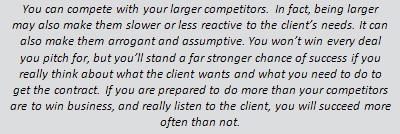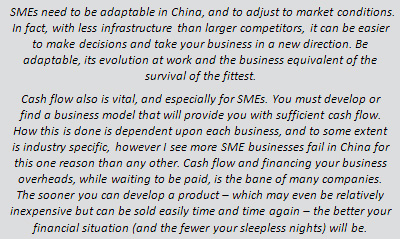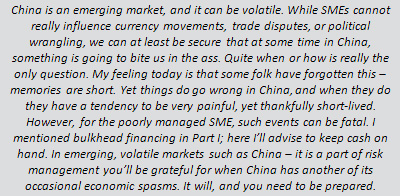SMEs in China and How to Manage One: Part II
Twenty early business lessons from a China entrepreneur
Lessons 6-10: From spreading your wings to China in crisis
This is part two of a four part series. To read part one please click here, part three is here, and part four is here.
Op-Ed Commentary: Chris Devonshire-Ellis
 Mar. 29 – By now the business was starting to be noticed within the expat community. It was time to hang out at foreign chambers and other trade bodies. The local British Chamber of Commerce was based in Guangzhou, which for me was a two hour coach ride, but I joined anyway. Not being able to justify the cost of an overnight hotel in Guangzhou I’d make my way back on the late bus at about 1 a.m., and get home by 3 a.m. Having an office in your own home can be beneficial. However, I also started to get involved in other chambers, and to see the commercial consuls of other countries in Guangzhou. There were, at the time, no consulates in Shenzhen and no chambers of commerce. I’d also do the same in Hong Kong – regularly visiting the many foreign consuls in Hong Kong and attending chamber events. Usually I’d be the only person that turned up from Shenzhen, and this gave me an advantage. Not many people were as familiar with the local business environment, so attending events in other cities proved wise. I’d also plan weekends and even holidays away in different areas of China, just to build up that knowledge base. It’s also fun and an amazing way to truly become the person people can turn to when they want to really know China. After five years of my business – I’d visited every capital city of every province. And all of this in time to celebrate the return of Hong Kong to China in 1997.
Mar. 29 – By now the business was starting to be noticed within the expat community. It was time to hang out at foreign chambers and other trade bodies. The local British Chamber of Commerce was based in Guangzhou, which for me was a two hour coach ride, but I joined anyway. Not being able to justify the cost of an overnight hotel in Guangzhou I’d make my way back on the late bus at about 1 a.m., and get home by 3 a.m. Having an office in your own home can be beneficial. However, I also started to get involved in other chambers, and to see the commercial consuls of other countries in Guangzhou. There were, at the time, no consulates in Shenzhen and no chambers of commerce. I’d also do the same in Hong Kong – regularly visiting the many foreign consuls in Hong Kong and attending chamber events. Usually I’d be the only person that turned up from Shenzhen, and this gave me an advantage. Not many people were as familiar with the local business environment, so attending events in other cities proved wise. I’d also plan weekends and even holidays away in different areas of China, just to build up that knowledge base. It’s also fun and an amazing way to truly become the person people can turn to when they want to really know China. After five years of my business – I’d visited every capital city of every province. And all of this in time to celebrate the return of Hong Kong to China in 1997.
Lesson 6
Back in Shekou one evening and hanging out with the local expats, one asked me if I knew anything about tax law in China. I knew a bit, and the rates were easy enough for me to spout off, but he wanted a review of his entire accounting procedure and to appoint bookkeepers to his company. It wasn’t small beer either; this business was a major Texas-based oil drilling entity in a JV with CNOOC. Assuring him I could help, yet not really knowing what to do about it, I went home for a think. Then my girlfriend piped up that her best friend had just left Arthur Anderson and could perhaps assist. She was applying to get a visa to take an MBA in the United State, and although that was too time consuming for an Anderson career, she’d have enough time on her hands to be part time. Virginia subsequently came on board and we went to see the Texan. He briefed us on the assignment: provide a quote for handling our accounts. Bids would also be coming in from PWC and a local tax firm. Virginia took it all apart and began to structure the proposal. But then I had a thought: The client had a JV, maybe it would be prudent to have a look at that contract to see if there were any provisions within it that may affect the work? We asked, and with eyebrows raised, the Texan gave it to us (the contract also helped serve as much needed intelligence on Chinese JV law). A week later, we got the job, because, as he said, “We thought about what you asked for and we agreed the contract is a vital component part of your being able to bid. The other two firms never asked to see it so you get the assignment.” It was the biggest contract the firm had ever had.
Lesson 7
That contract had a profound effect on the business. Up to this point, we’d been providing legal administration services, now we were doing accounting. In fact, the nature of legal admin had been a concern to me when I thought about the business; such work was highly erratic in nature. We’d get one good month of billing, then nothing for two months. I needed to secure a more sustainable and more regular form of service. I had, by chance and a bit of luck, just found the answer. Dezan Shira wouldn’t just provide legal work, we’d also provide financial administration.
Lessons 8 and 9
Meanwhile, the handover of Hong Kong to China that was then taking place was turning out to be a weird time. By then I’d been operating on the China fence side for five years, and I was more familiar now with Shenzhen than I was in keeping up with the new bars and places to hang out in in Hong Kong. I went across the border from Shenzhen to Hong Kong and back again on the last day of the territory being under British administration. Wandering around all the bars and pubs where I’d hung out five years before, I had expected to bump into a few friends. But I didn’t, they’d all left. It also poured with rain and was a miserable day all in all. Things were also about to get a lot worse. A few months after Hong Kong’s return, in doing my budgets for 1998, I decided to increase my marketing expenditure by 100 percent, and to devote significant expenses into magazine and newspaper advertising. I took out monthly adverts in Dragonair’s inflight magazine, The South China Morning Post, That’s Shanghai, That’s Beijing and That’s Guangzhou, in addition to the China Daily. 1997 had been a strange, yet productive year, and I finally felt the business was getting somewhere. I began to think of buying a car. Then the Asian Financial Crisis hit and within six months my business had become insolvent. Betting that China would devalue the RMB as all other Asian countries went into financial meltdown, foreign investment in China, bar the essentials, dried up. There was little point in pumping money into China and an RMB that could quite possibly significantly devalue. I was, as a result of global currency fears, going broke.
Lesson 10
This is part two of an original four part series on managing and operating a SME in China from scratch. To read part one please click here, part three is here, and part four is here.
Chris Devonshire-Ellis is the founding partner and principal of Dezan Shira & Associates, a foreign direct investment practice offering legal establishment, tax, accounting and due diligence services throughout China. Established in 1992, the firm now has ten China offices, five in India and two in Vietnam.
 Chris’ popular book “The Story of a China Practice” details his early years of setting up in China and is a must read for all entrepreneurs interested in the country. It sold out its initial print run of 10,000 copies but is now available as a complimentary download from our Asia Briefing Bookstore here.
Chris’ popular book “The Story of a China Practice” details his early years of setting up in China and is a must read for all entrepreneurs interested in the country. It sold out its initial print run of 10,000 copies but is now available as a complimentary download from our Asia Briefing Bookstore here.
- Previous Article SMEs in China and How to Manage One: Part I
- Next Article Foreign Participation Surges in China’s Property Development
























